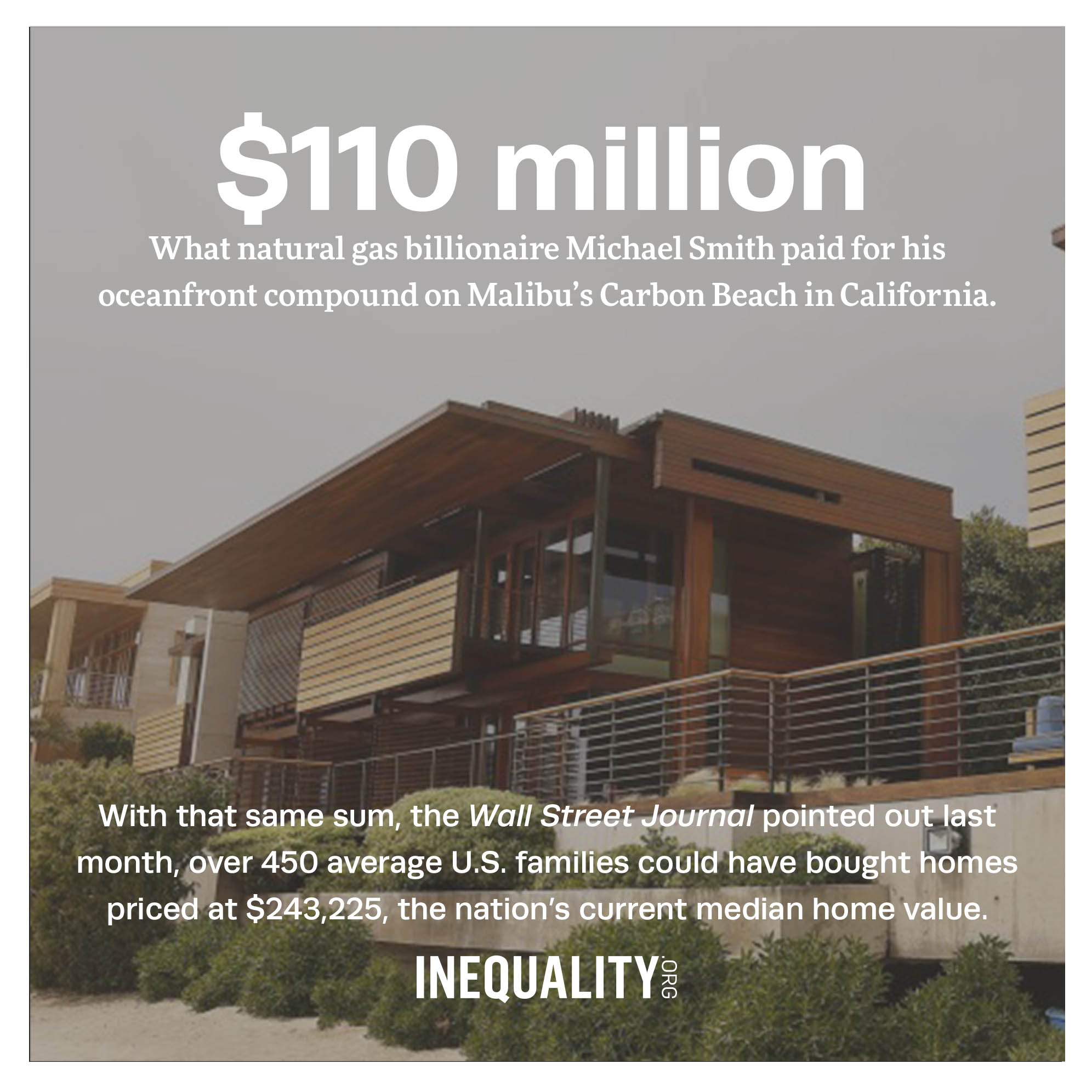| THIS WEEK |
If only a new decade really meant a fresh start...
With the 2020s just a few days old, the Trump administration has already reminded us what we stand to lose if we don’t make massive, rapid changes to our political and economic systems. The drone-strike assassinations of Iranian and Iraqi officials have put people across the Middle East — and the world — in greater danger.
These same assassinations, my colleague Sarah Anderson details in a new Inequality.org analysis, are triggering windfalls for top U.S. military contractors and their CEOs. The longer we allow these execs to make big money off our war economy, the more likely wars will be. In the new decade ahead, we need to do better.
Chuck Collins, for the Institute for Policy Studies Inequality.org team |
|
| |
|
| INEQUALITY BY THE NUMBERS |
 |
|
|
|
| |
|
| FACES ON THE FRONTLINES |
 |
| The Campaign to Guarantee Good Jobs for All |
| Tackling toxic inequality requires breaking up the stranglehold of wealth at the top, growing the middle class, and ensuring that everyone has a standard of living that affords economic security and dignity. A new campaign is building support for one crucial tool toward breaking that stranglehold and establishing real support for economic security: a Federal Job Guarantee. PolicyLink’s Sarah Treuhaft and Angela Glover Blackwell have more about the new manifesto from Jobs for All. |
|
| |
|
| WORDS OF WISDOM |
 |
|
|
|
| |
|
PETULANT PLUTOCRAT
OF THE WEEK |
 |
| Globalization’s First High-Profile CEO Bail-Jumper! |
| Auto exec Carlos Ghosn has never cared much for how the Japanese do business. And that has ruffled feathers in Japan ever since Renault bought control of Nissan in 1999 and sent Ghosn to overhaul the Japanese automaker. In short order, Ghosn became Japan’s top-paid CEO. By 2011, his pay totaled $12.4 million, over six times the Toyota CEO take-home. And Ghosn wanted more. Japan, he pronounced, is “going to have to make more investments in executive compensation” to remain “competitive” in world markets, where U.S. execs just happened to average 11 times the pay of their Japanese counterparts. Ghosn apparently tired of waiting for Corporate Japan to heed his call. Late in 2018, Japanese prosecutors arrested Ghosn after an audit revealed that he had concealed $44 million of his actual pay. The prosecutors called Ghosn a “flight risk” and wanted him kept behind bars before trial. But Ghosn won bail — and last week proved prosecutors right. He slipped past security cameras and ended up in Lebanon declaring he had fled “injustice and political persecution.” |
|
| |
|
| GREED AT A GLANCE |
 |
|
|
|
| |
|
| TOO MUCH |
 |
| The Seven Square Inches Making Us More Unequal |
| What happens when we use our credit cards? We all think we know. We charge a purchase on our card, we incur a debt. If we pay off that debt within a month, we face no interest charge. End of story. Not quite. Something else is happening whenever we make a credit card charge: We’re making already rich people considerably richer. Our generosity — to the deep pockets above us — operates on two levels, one that will come as no surprise to anyone who’s been following corporate pay patterns, the other reflecting a cash-register dynamic that hardly any of us know anything about. Inequality.org co-editor Sam Pizzigati has more. |
|
|
|
| |
|
| MUST READS |
This week on Inequality.org
Sarah Anderson, The Threat of War Inflates Stock Holdings of Military Contractor CEOs. As long as the top executives of our privatized war economy can reap unlimited rewards, the profit motive for war in Iran — or anywhere — will persist.
Frank Clemente, Eight Ways the Trump-GOP Tax Cuts Have Made the Rich Richer While Failing Working Families. In the two years since Congress passed the Republican tax law, the richest 1 percent have been the big winners.
Steve Beyersdoerfer, Postal Workers Deliver 20 Million Packages Per Day. What Can We Give Them in Return? Congress should take bipartisan action to protect this vital public service and the good jobs it maintains.
Elsewhere on the Web
Sheelah Kolhatkar, The Ultra-Wealthy Who Argue That They Should Be Paying Higher Taxes, New Yorker. An ace profile of the egalitarians who make up the advocacy group Patriotic Millionaires.
Robert Reich, The biggest business con of 2019: fleecing workers while bosses get rich, Guardian. The best way to make corporations socially responsible? Enact laws requiring them to be.
Joel Kotkin, How America is reverting back to the feudal age, New York Post. With wealth concentrating at every turn, the United States risks becoming what amounts to feudalism with better marketing.
Ryan Grim and Jon Schwarz, The Defenders of the Wine Cave Are Missing the Point, Intercept. Yes, billionaires ought to have just as much say as plumbers on who becomes president. But private high-donor events give billionaires access to candidates while plumbers have no entry, unless a pipe breaks.
Mona Fawaz, What protests in Lebanon can tell us about inequality worldwide, Al Jazeera. Confronting inequalities means confronting entrenched interests.
John Jennings, Could Giving Up U.S. Citizenship Help Wealthy Americans Reduce Their Tax Burden? Forbes. A tax lawyer’s answer: Thanks to the already existing federal “exit tax,” few rich Americans will be able to dodge the wealth tax Elizabeth Warren and Bernie Sanders are both seeking.
Andy Summers, Inequality and the 1%: what The Economist overlooked, London School of Economics. Inequality denialism seems to be making a bit of a media comeback. This new analysis patiently punctures the latest denialism trial balloon.
Joseph Thorndike, Wealth Taxes Will Remain Impossible — Until They Aren’t, Tax Notes. The income tax was kicking around American politics for over a century, the nation’s top tax historian notes, before becoming permanent element. Wealth tax advocates need to keep pushing.
Simon Johnson, Getting Past Reagan, Project Syndicate. The real question before the American people in 2020: How much longer will billionaires be allowed to decide which political outcomes are possible? |
|
| |
|
| A FINAL FIGURE |
 |
|
|
|
| |
|
|